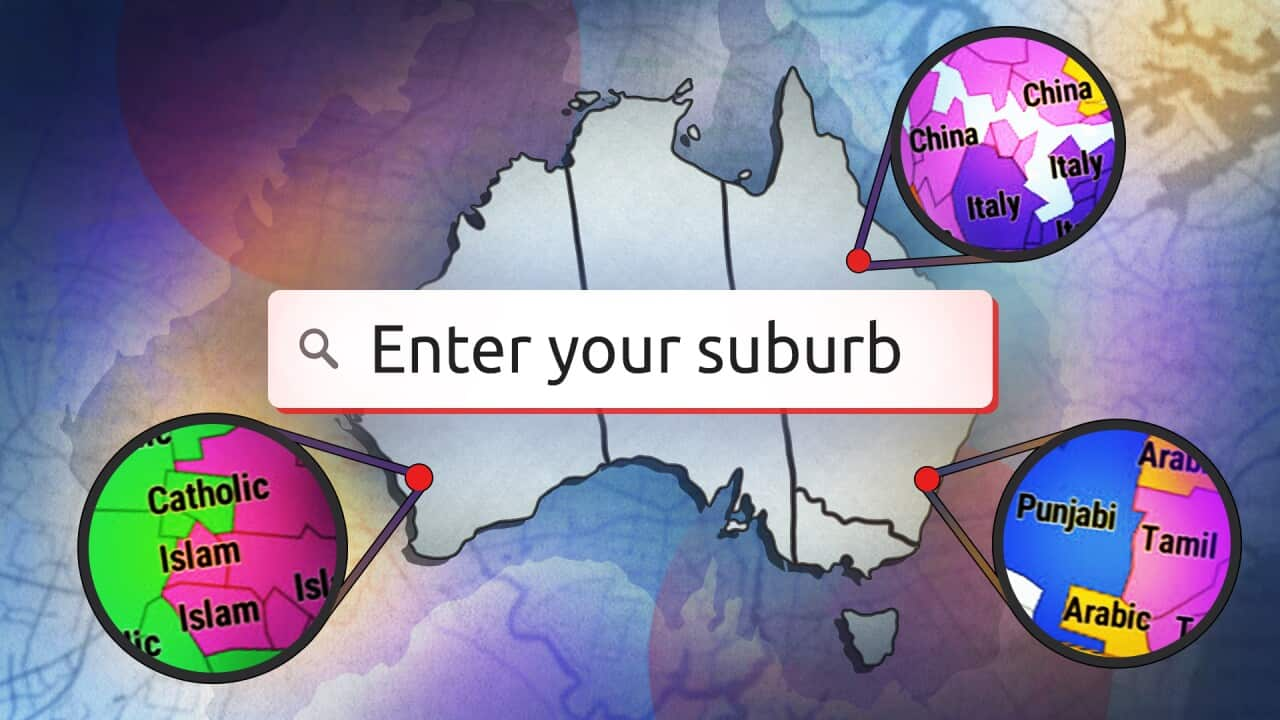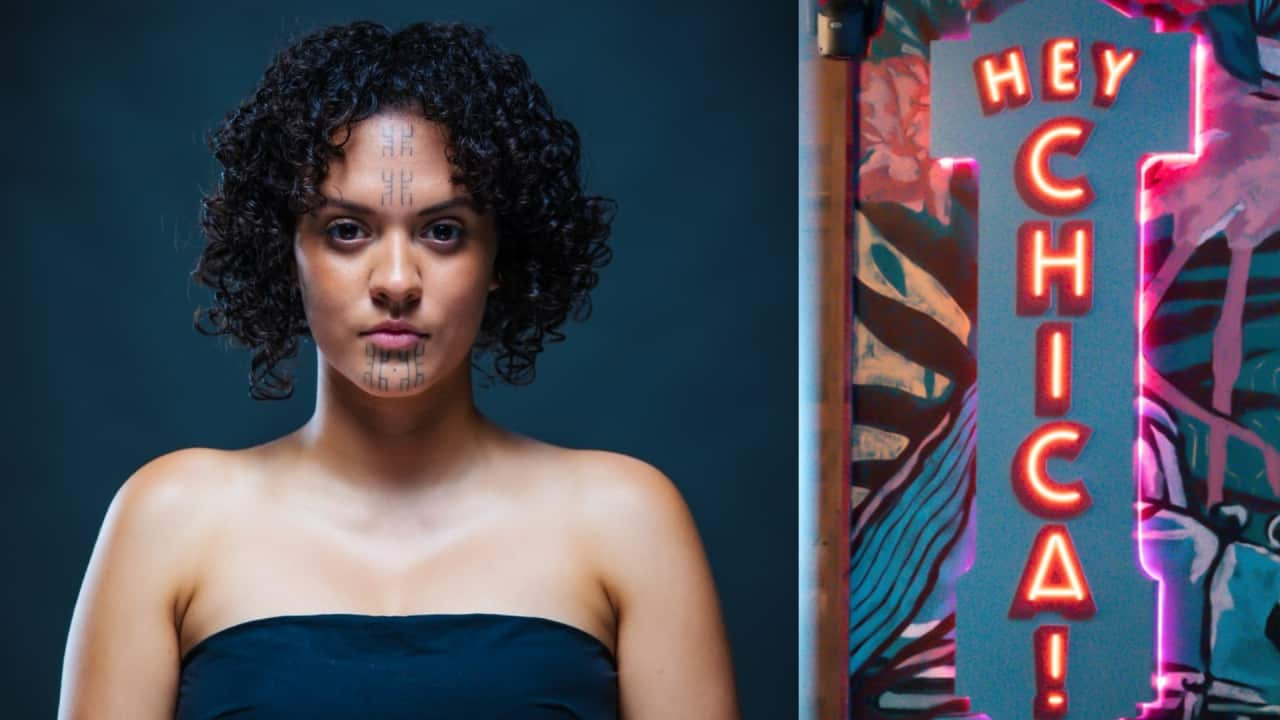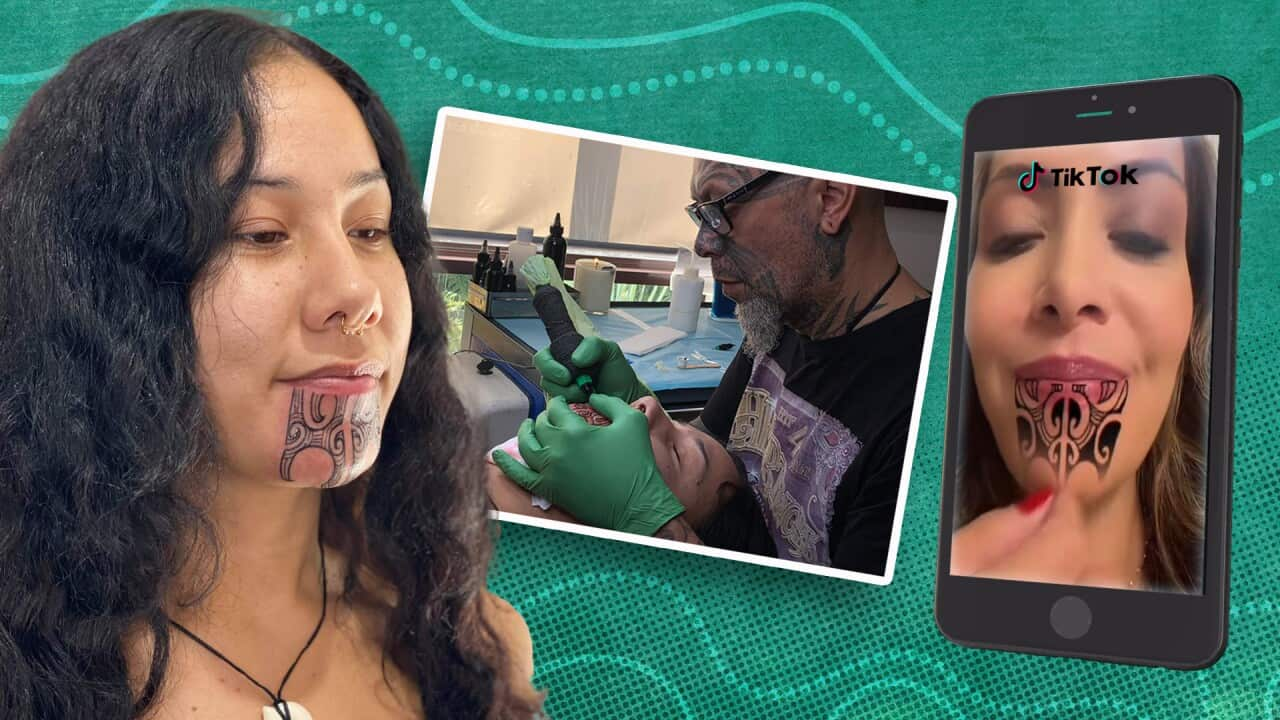Moale James was out celebrating her partner’s birthday in Brisbane last year
The reason? Cultural markings on her face.
Ms James, 24, is an Australian Motu-Kekeni woman. Her face is marked with reva reva - cultural markings that Indigenous women in Papua New Guinea have worn for centuries.
Now, 10 months on from the incident, she says a “positive” outcome has been reached. After discussions with Ms James over several months, the company behind Hey Chica! - Hallmark Hospitality - is changing its entry policy across all of its venues.
“I’m really proud of where we’ve all come, and I’m really proud of the way my community has been able to support me throughout this,” Ms James told SBS News.
It comes as Māori woman Juanita McNamara says she was denied entry from another of the company’s bars this weekend due to her cultural markings.
‘I can’t let you in because of your face’
Ms James has undergone healing with her community since the incident. But ultimately, she says it has been a “positive learning experience” for herself, her community and the company that owns Hey Chica!.
Last June, Ms James lined up at the popular bar in Fortitude Valley with friends, but was told by a security guard she wasn’t allowed in.
“I was denied entry there because they had a blanket policy where no face, neck or hand tattoos were permitted into the venue,” she said. “The bouncer at the nightclub said, 'I can't let you in because of your face’.
“I advised him that it was a cultural mark. He said it was a blanket policy, and he wasn’t able to let me in.”

Last year, Moale James was refused entry into a bar in Queensland because of her cultural markings on her face. Source: Supplied by Danyal Syed / Thomas Oliver
“I wear the marks of my great-grandmother, my Gatana Palu. These marks are our family marks. They tell us how we’ve lived, what community we belong to, who our family is,” she said.
Ms James recently visited her great-grandmother’s grave during a visit to Papua New Guinea in recent weeks.
She says the marks are not just what many might call tattoos.
“These are a form of my expression, my identity, and my culture. They are part of my family history and our story. It just happens to be on our bodies, not in a book.”
These are a form of my expression, my identity, and my culture. They are part of my family history and our story. It just happens to be on our bodies, not in a book.Moale James
She says she wasn’t surprised about the incident when it happened. But it still affected her.
Ms James wrote about the incident on social media and soon after, she says a “media storm” ensued.
After that said while it appreciates the rule caused “unintended distress”, it would continue to enforce its blanket policy under the Liquor Act.
Under Queensland liquor laws, licensees and staff may refuse service to patrons because of the law and safety of patrons or others provided it is warranted and is not discriminatory.
They are required to take reasonable steps to remove, refuse or exclude people wearing items linked to “identified organisations”.

Ms James recently visited her family in Papua New Guinea where her Bubu Nelly, the eldest sister of her grandmother's generation, looked at her marks. Source: Supplied by Danyal Syed / Moale James
“That case with the Commission was closed in January this year, and we’ve [Ms James and Hallmark Hospitality] have been working together since then,” she said.
SBS News has contacted the Commission for comment.
A policy change
Ms James said she has engaged in many difficult and “vulnerable” conversations with Hallmark Hospitality.
“We haven’t agreed the entire time. But we’re both sitting at a point now where we’re both happy with the outcome,” she said.
In a statement, a spokesperson for Hey Chica! said it has reviewed its house policy following positive consultation and collaboration with key stakeholders.
“Invaluable guidance and advice was provided and Hey Chica! is updating its policy and procedures to reflect and endorse the business’ commitment to providing a safe and welcoming environment for all patrons and employees,” it said.
The current entry policy prohibits head and neck tattoos. The spokesperson said this is being updated to prohibit tattoos that may be deemed offensive or gang-related.
The policy will come into effect by 1 June this year across the group’s entire portfolio of venues once staff have been trained in the new procedures.
“Moale James has provided us with invaluable guidance and consultation and we are pleased with the positive and collaborative manner of these discussions,” the spokesperson said.
It comes as another woman says she was refused entry from another of the company’s bars this weekend due to her cultural markings.
Māori woman Juanita McNamara, whose tribe is Ngati Kahungunu, has a moko kauae or “treasure” on her chin to represent her identity and culture. She also has a ta moko on her neck, representing her mother and sister.
READ MORE

How multicultural is your suburb?
Ms McNamara, 40, says she attended Irish pub Finns McCools on Saturday night after a charity event in Fortitude Valley.
“The security said I wasn’t allowed in - first of all, it was my face and neck tattoos. I said, ‘these are cultural’. She said, ‘No, these are the venue rules.’”
She said a security supervisor later said it was due to her “face tattoos”.
Ms McNamara said the incident made her feel humiliated and unheard.
“Ultimately, I felt injustice, and that I now need to be the messenger for others who don’t have a voice,” she said.
She said a company director had reached out to her with an apology.
A spokesperson for Finn McCool also said it has reached out to Ms McNamara to apologise for her experience at the venue.
"Finn McCool’s Fortitude Valley has been reviewing its entry policy following extensive consultation and collaboration with Moale James over the past few months," they said.
"Finn McCool’s Fortitude Valley is currently in the process of updating its venue entry policy to reflect and endorse the business’ commitment to providing a safe and welcoming environment for all patrons."
Ms McNamara said changes to the venues’ entry policy would encourage others to follow suit.
“I think it's okay to get things wrong sometimes - as long as you're willing to change, and as long as you're willing to learn,” Ms James said.


